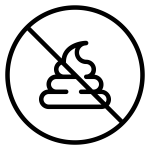Aidha Wembabazi is married with three children (13, 10 and 7 years old) who attend classes at a local government school. She and her husband have been peasant farmers in Rubana Village for the past 16 years.
The majority of families here grow food crops such as maize, cassava, sweet potatoes, groundnuts, and beans, and will grow sugarcane for commercial purposes. Food surpluses and sugarcane are normally sold at local markets or to vendors. Some households raise livestock such as chicken, goats, and pigs that are also sold in local markets.
Each day, Mrs. Wembabazi and other women from the 30 households in this community travel more than 2 miles to get water. There is an open water source located a mile away that is used for household needs, but the two nearest wells that are acceptable for drinking are more than one and two miles away respectively.
"The water problem here is a common challenge," said Mrs. Wembabazi.
"I do travel long distance for clean and safe water. When I leave home for water a 6 pm, I return home at around 9 pm."
When asked why not sending the kids this far distance for water, she responded, "I can’t send the children and get them knocked by speeding cars and trucks on the road and more so, my children are young to travel that long distance for water. I rather do it myself."
The negative consequences of the water problem here include loss of productive time due to the hours spent collecting water. Diseases such as acute watery diarrhea and worm infestations are caused by dirty water. Furthermore, households are impacted by the money spent treating illnesses and lose time traveling to the hospitals which do not always carry the medicines needed for treatment.
"It’s me who ensures there is adequate, safe, and clean drinking water available at all times," said Christine Kaija.
"The household need for clean drinking water amounts to two 20-liter jerrycans. As a result of time spent fetching water, I lose cooking time for my family. That, at times, creates a misunderstanding with my spouse."
Village Chairperson Isaac Kasaija Wambabia echoed the very same problem. He reported a case where a husband accused his wife of having an affair because she was gone for long stretches fetching water. The problem was not an affair, it was the fact that the sources are so far away that it takes hours for each trip. The lack of access to water in this community places a lot of stress on women here, he said.
We also observed that the village has very basic sanitation and hygiene facilities, and rather low coverage. The village has no dedicated handwashing facilities and there is a lack of garbage pits. In fact, many households wait until it is dark for bathing since they do not have dedicated shelters to do so during the day, said Vincent Kyaliogonza.
"Hygiene and sanitation conditions in my village are not good," he told us. "I can say, only one to three of the [30] households have basic hygiene and sanitation facilities."
Here’s what we’re going to do about it:
New Hand-Dug Well
With the guidance of our artisans and mechanics, the excavated well will be cased, sealed with a well pad, and then finished with a new Consallen pump. The community will participate in excavating and constructing the water source.
Excavation takes a month or more on average, depending on the nature of the rock beneath. Construction of the well lining and installation of the pump takes on average 12 days.
This well will be located in Rubana Community and will bring clean water closer to families having to walk long distances for their water.
Training
Training’s main objectives are the use of latrines and observing proper hygiene practices since these goals are inherently connected to the provision of clean water. Open defecation, water storage in unclean containers and the absence of handwashing are all possible contaminants of a household water supply. Each participating village must achieve Open Defecation Free status (defined by one latrine per household), prior to the pump installation for a shallow hand-dug well.
This social program includes the assignment of one Community Development Officer (CDO) to each village. The CDO encourages each household to build an ideal homestead that includes: a latrine, handwashing facility, a separate structure for animals, rubbish pit and drying rack for dishes.
We also implement the Community Led Total Sanitation (CLTS) approach with each of our village partners. This aims to improve the sanitation and hygiene practices and behaviors of a village. During these sessions, village leaders naturally emerge and push the community to realize that the current practices of individual households – particularly the practice of open defecation– are not only unhealthy but affect the entire village. CLTS facilitates a process in which community members realize the negative consequences of their current water, sanitation and hygiene behaviors and are inspired to take action. Group interactions are frequent motivators for individual households to build latrines, use the latrines and demand that other households do the same.
Improved Sanitation
The aim is that all households own an improved latrine. Many households do not use a latrine but use the bush. Due to open defecation, feces are spread all over the village. This leads to waterborne diseases and contamination of groundwater and surface water. Our aim is that the community is able to live a healthy life free of preventable diseases. We endeavor that at the end of our presence in the community, people will have both access to sustainable, clean water and access to sanitation. We have now organized families to form digging groups for latrine construction, and empowered them with tools to use.

 Protected Dug Well
Protected Dug Well
 Rehabilitation Project
Rehabilitation Project






























